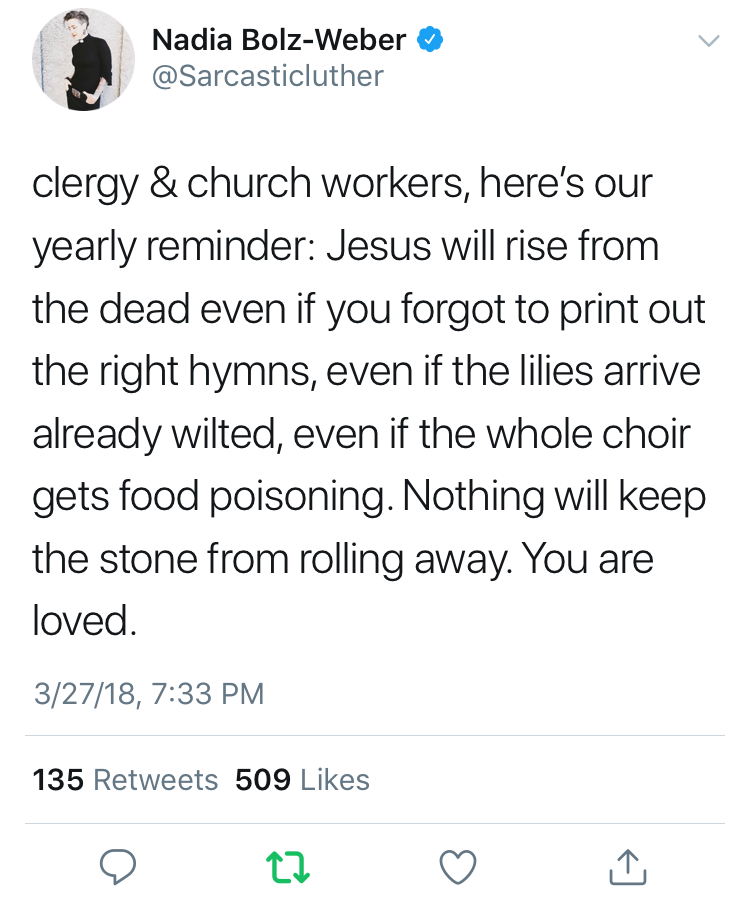Last week, I spent three days with churches from all over the country as they invested in going deep theologically around the concepts of calling and vocation. It was an incredible experience (and one I will share more about soon!), and I am looking forward to our journey over the next few years as part of the C3 Project with Vibrant Faith.
And, like you do, when a room full of people is talking about calling, you have a chance to continue to explore your own calling. (In case you were wondering, that process never stops!) As I thought through the incredibly diverse journey of calling I've been on since my teen years, and especially looking at the last 6 months as I have branched into a brand new iteration of my call, I looked around the room, realizing these were folks that were my ideal constituents.
The people in the room consisted of pastors and church staff, clergy and laity, leadership and congregation. As I looked around, I saw the people I cared about the most - all of them! Representatives of the whole church.
You see, becoming an "expert" in intergenerational ministry has been interesting. The study and practice itself has been absolutely fascinating, but what's more interesting is what other people think that means. Some of the most revelatory work I do with churches and leaders simply involves definitions. When I tell people I work in intergenerational culture-building and intergenerational ministry, they usually form a picture in their head of what that means, even before I have spelled out the specifics.
The positive is that in general, people seem to see value in intergenerational relationships and intergenerational culture-building. However, their understanding of what it means is usually far narrower than my actual scope of work.
Somehow, when we talk about an intergenerational church, intergenerational activities, intergenerational ministry, people only see that as one of two things.
1) They see it as family ministry. And their definition of "family" is the stereotypical nuclear parents-and-kids image. "Oh, that's great! Can you come teach a parenting class for us?" No, the answer is no. I'm not an expert on family ministry (I know some things, but there are much better folks out there!). I'm not a resource on parenting. Family ministry is a subcategory of intergenerational ministry, not its entirety (future post coming on that relationship!).
2) They see it as doing more things that are "for the kids." Do I spend a lot of time talking about how we better include children in our congregations? You betcha. Is intergenerational ministry about kids? Yep. And teenagers, and babies, and emerging adults, and middle adults, and older adults, and anyone else you can imagine.
What ends up happening is as an "intergenerational ministry expert," I get put in the kids' or youth ministry box. Now don't get me wrong, these are some of my favorite folks to work with, and they are a lot of the reason I do what I do! However, the best thing I can do for them is to get in the room with the senior pastor. The best thing I can do for them is to cast the full vision of what I'm talking about to the person who is ultimately casting the vision for their community.
I'm excited to be leading two Intergenerational Leadership cohorts starting this month of ministers working in children's ministry or Christian education in their churches; and I expect a lot of the conversation to center around how they "lead up" to help their senior pastors better understand this importance.
Because, folks, here's the thing. Intergenerational ministry is essential for kids. And intergenerational ministry is essential for adults. Part of being mature, Christian adults is how we engage the next generations. Our own faith formation is tied up in how we engage the faith formation of younger generations. If we're not participating in the faith formation of others, we will stagnate. We will stall. We will no longer grow.
So sure, you can engage in intergenerational ministry because families matter. You can engage in intergenerational ministry "for the kids." But in the end, it's about all of us. And if we aren't ensuring this idea, this approach, is about all of us, then we're missing the boat. We're missing a huge part of the body of Christ.
Intergenerational ministry isn't (just) about kids. And if you're intrigued, I'd love to talk more with you about how I can help broaden your experience and capacities for caring for all God's children, at all ages and stages.
To learn more, visit the coaching, consulting and speaking pages. Or, just go ahead and schedule a free 30-minute consultation with me! I would love to work with your ministry!




